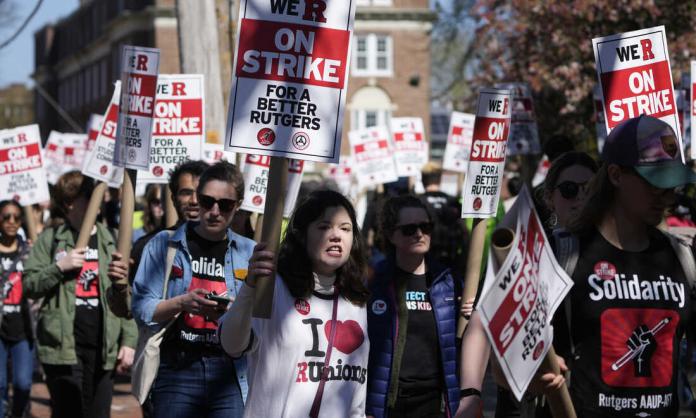Academic workers at Rutgers University in New Jersey have achieved a stunning victory with a serious campaign of industrial action, centred on an open-ended strike. Their approach is a model for unionists in Australia.
The five-day strike united all academic workers, from graduate teachers through to tenured professors. Management was forced to concede a 43 percent pay rise for the lowest paid, as well as more job security. This is the latest in a wave of seventeen strikes in US higher education in the last year, including a five-week strike at the University of California.
The Rutgers strike was distinctive because it involved all sections of the academic workforce. It was the first strike in Rutgers’ 257-year history, and New Jersey’s biggest ever public employee strike.
Before the strike, Rutgers administration was refusing to budge. No progress had been made in ten months of bargaining. Unions responded by balloting their members for an open-ended strike. On 9 April, New Jersey Governor Phil Murphy tried to get it called off. The unions refused. The following day, 9,000 workers walked out. Unionists set up pickets at Rutgers’ three campuses and organised big rallies.
The strike showed what can be achieved with serious and consistent preparation. Over the previous six years, the American Association of University Professors-American Federation of Teachers (AAUP-AFT) built a strong network of workplace delegates. From October last year, 500 members were educated in the union’s strike school. Later, 800 attended a picket line school and hundreds attended picket captain training.
“Once the strike began, member participation on the picket lines and creative protests demonstrated our strength, and generated media attention and political pressure on the university”, Sherry Wolf, organiser for the AAUP-AFT, told Red Flag. “There was an Arts and Events coordinator for the strike. They had drag shows, entertainment, concerts. There were creative workers in the union, but they weren’t active previously. Now, given the opportunity, they went into overdrive.”
The president of Rutgers, historian Jonathon Holloway, emerged as a hate figure, especially after he threatened legal action against the strike. A viral social media clip captured the spirit of resistance. The song “Hey Baby” was changed to “Hey Holloway”; protesters sang “Hey Holloway, I want to know if you’ll raise my wage!”. Wolf recounts: “1,500 people together led by a bunch of musicians who’d never played the song before, sung by a bunch of people who’d never sung the song before, led by the guy who’d made up the song a couple of hours earlier”.
Meanwhile, intensive negotiations took place during the strike days. After five days, and the governor’s intervention, the unions decided to suspend the strike. This was controversial because some workers wanted the strike to continue. The unions organised protests during the continuing negotiations.
The agreement includes big salary gains: 30 percent for the lowest-paid adjuncts in the first year, and 43 percent across the life of the contract. “Adjuncts” are paid per class (unit) taught and must reapply for their jobs each year. This is like casual (sessional) teaching at Australian universities. For adjuncts, the agreement also includes “multi-semester and multi-year appointments—a first—as well as professional development funding, binding arbitration for grievances, quicker and new paths to advancement, and a new title”, Bryan Sacks and Michael Reagan observe in Labor Notes.
Non-tenured, full-time faculty—like academics on fixed-term contracts in Australia—won presumptive contract renewals. These measures reduced job insecurity.
Finally, graduate assistants—precarious, low-paid workers who conduct teaching or research while undertaking postgraduate degrees—won a 33 percent pay rise. Because the pay of grad assistants is generally low, Australian university bosses are starting to create these kinds of jobs, unfortunately with the encouragement of senior union officials.
“We tried very hard over a long period of time to talk to people in a language they would understand”, Wolf explains. “‘Rutgers has the money, we have the power. We can’t be treated this way, we can build a different type of university. If we stand together, they can’t beat us—we can do this’. That made sense to people.”
Negotiations were not behind-the-scenes affairs—sometimes management would be forced to negotiate with 50 unionists in the room. And more than 650 people have joined the union since the strike authorisation vote on 28 February. “There’s nothing like an organising plan and a struggle to get people to see the value of their union”, Wolf argued.
The organised left played an important role. Wolf says that the AAUP-AFT at the university is “widely seen as a more progressive union, even a left union ... Rutgers is probably the Chicago Teachers Union of higher ed at this point. It’s a wall-to-wall union across ranks and categories, with a wider vision”. Wolf, a socialist, was hired by the union ten years ago “to build them a rank-and-file shop stewards’ network, which I’ve done”. Others in the elected leadership and union staffers are radicals and “all of our air war was led by people with some political sophistication and knowledge”.
“So, we had active leftists like ourselves. Then there’s also a number of people from the DSA [Democratic Socialists of America] who are among our members—faculty as well as graduate workers. Occupy, Black Lives Matter, and just the pandemic, organising mutual aid ... played a role in creating the ideological basis for deeper sympathy with this kind of posture”—that is, a serious strike strategy.
For Wolf, a highlight of the strike was watching people be transformed by the struggle: “Seeing people who were well outside their comfort zone of a few days before signing people up, serving coffee, setting the parameters of a picket line and just being leaders” she said. “Watching people flourish was one of the most beautiful things for me.”
Alexis is a workplace representative for the National Tertiary Education Union.










